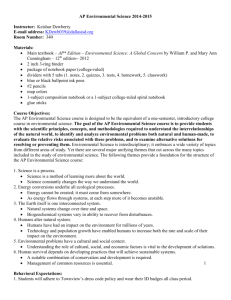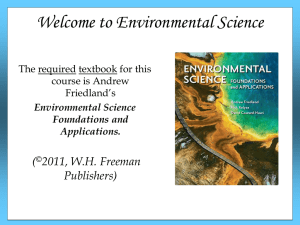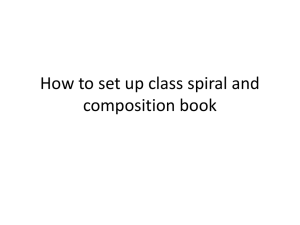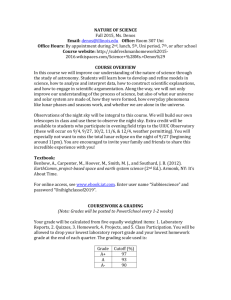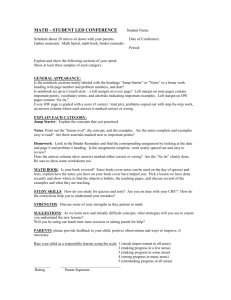topics miss
advertisement
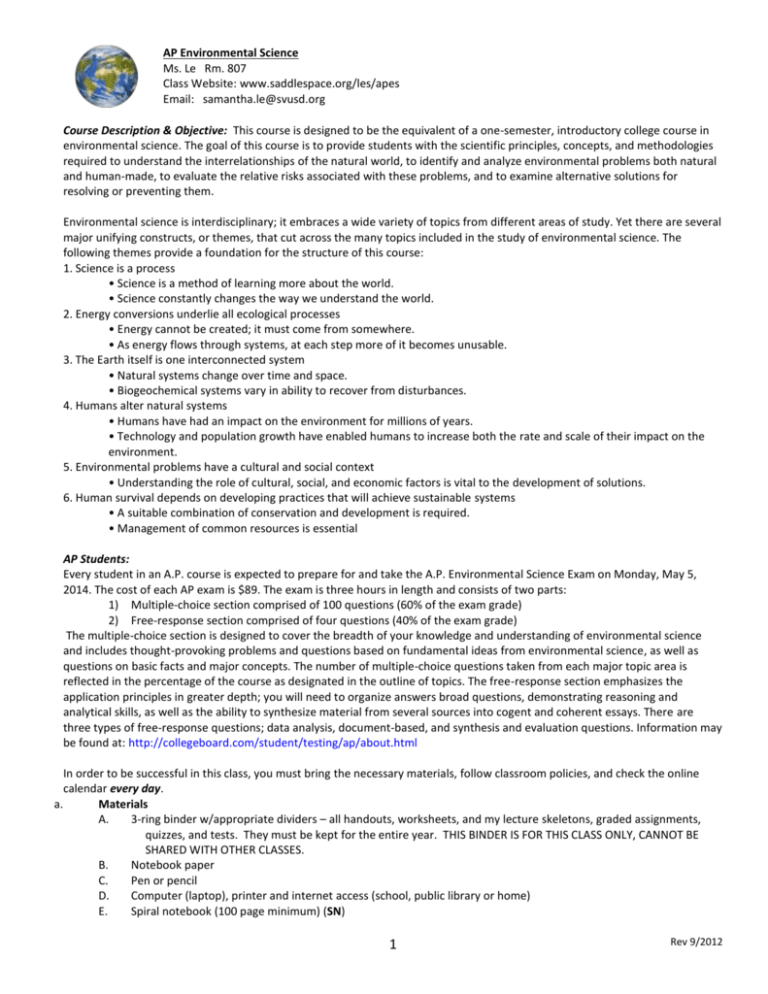
AP Environmental Science Ms. Le Rm. 807 Class Website: www.saddlespace.org/les/apes Email: samantha.le@svusd.org Course Description & Objective: This course is designed to be the equivalent of a one-semester, introductory college course in environmental science. The goal of this course is to provide students with the scientific principles, concepts, and methodologies required to understand the interrelationships of the natural world, to identify and analyze environmental problems both natural and human-made, to evaluate the relative risks associated with these problems, and to examine alternative solutions for resolving or preventing them. Environmental science is interdisciplinary; it embraces a wide variety of topics from different areas of study. Yet there are several major unifying constructs, or themes, that cut across the many topics included in the study of environmental science. The following themes provide a foundation for the structure of this course: 1. Science is a process • Science is a method of learning more about the world. • Science constantly changes the way we understand the world. 2. Energy conversions underlie all ecological processes • Energy cannot be created; it must come from somewhere. • As energy flows through systems, at each step more of it becomes unusable. 3. The Earth itself is one interconnected system • Natural systems change over time and space. • Biogeochemical systems vary in ability to recover from disturbances. 4. Humans alter natural systems • Humans have had an impact on the environment for millions of years. • Technology and population growth have enabled humans to increase both the rate and scale of their impact on the environment. 5. Environmental problems have a cultural and social context • Understanding the role of cultural, social, and economic factors is vital to the development of solutions. 6. Human survival depends on developing practices that will achieve sustainable systems • A suitable combination of conservation and development is required. • Management of common resources is essential AP Students: Every student in an A.P. course is expected to prepare for and take the A.P. Environmental Science Exam on Monday, May 5, 2014. The cost of each AP exam is $89. The exam is three hours in length and consists of two parts: 1) Multiple-choice section comprised of 100 questions (60% of the exam grade) 2) Free-response section comprised of four questions (40% of the exam grade) The multiple-choice section is designed to cover the breadth of your knowledge and understanding of environmental science and includes thought-provoking problems and questions based on fundamental ideas from environmental science, as well as questions on basic facts and major concepts. The number of multiple-choice questions taken from each major topic area is reflected in the percentage of the course as designated in the outline of topics. The free-response section emphasizes the application principles in greater depth; you will need to organize answers broad questions, demonstrating reasoning and analytical skills, as well as the ability to synthesize material from several sources into cogent and coherent essays. There are three types of free-response questions; data analysis, document-based, and synthesis and evaluation questions. Information may be found at: http://collegeboard.com/student/testing/ap/about.html In order to be successful in this class, you must bring the necessary materials, follow classroom policies, and check the online calendar every day. a. Materials A. 3-ring binder w/appropriate dividers – all handouts, worksheets, and my lecture skeletons, graded assignments, quizzes, and tests. They must be kept for the entire year. THIS BINDER IS FOR THIS CLASS ONLY, CANNOT BE SHARED WITH OTHER CLASSES. B. Notebook paper C. Pen or pencil D. Computer (laptop), printer and internet access (school, public library or home) E. Spiral notebook (100 page minimum) (SN) 1 Rev 9/2012 1. F. You must have a spiral notebook by Wed 9/11/13. ( College ruled 100 page notebook at Staples is recommended) 2. Spiral notebooks will have all your OWN notes as you read the chapters…all organized: a. You may choose a style of note taking from the following: outline, concept map, or Cornell notes b. All vocab words (in bold black) must be highlighted! c. POP QUIZZES WILL BE GIVEN PERIODICALLY TO CHECK THAT YOU HAVE READ CHAPTERS AND TAKEN NOTES. YOU MAY USE NOTES FOR POP QUIZ!!! 3. All the Checkpoint Questions in one of two formats: a. Write down questions and answer in phrases. b. Include question in the answers. 4. DO THE MATH (DTM): in each chapter, there are these activities. Some have the questions written directly on the page you will be reading. Others will not so I will be providing you the questions for these. 5. Spiral notebooks will be collected on test days OR when teacher has time in class to correct (will be announced in advance). If you are absent on the day the spiral notebook is collected, you must get it to me right upon return or you will receive a zero. Composition notebook (CN) 1. You must have a composition notebook by Wednesday 9/11/13. 2. It will include assigned Working Toward Sustainability Activities and Weekly Current Event Reflections. For each weekly Current Event Reflection, you must answer these four questions: a. Give a brief description of the issue and describe how it relates to environmental science b. What are the scientific, economic, and political implications associated with this article? c. Identify the species and/or groups of people impacted by the issue. Describe how each is or potentially will be affected by the decisions made. d. Make a personal stand on the issue. What is your take? How should the issue be addressed or resolved? Why? Provide support, reasons, etc. for your stand. The support you provide is an important as your personal stand. 3. Composition notebooks will be collected on test days OR whenever teacher has time in class to correct (it will be announced in advance). If you are absent on the day the composition notebook is collected, you must get it to me right upon return or you will receive a zero. G. c. d. e. Environmental Science for AP by Friedland and Relyea – main book 1. Student companion site link - http://bcs.whfreeman.com/friedlandapes a. Online quizzes, lab handouts, math videos accompany the Do The Math Activities, key term flashcards and flashcard quizzes b. You need to register in order to take quizzes and submit them to my email address. Environmental Science: Earth as a Living Planet by Botkin and Keller – supplemental book – I will refer to this book once in a while. Keep it at home. 1. Student companion site link – http://tinyurl.com/BOTKIN-KELLER Grading Policy A. Online quizzes, in-class quizzes, and tests (55%) (quizzes will be taken online at student’s companion site and save it to my email address (samantha.le@svusd.org)) B. Lab reports and activities (20%) – consult “How to Write a Lab Report” for lab report format C. Spiral Notebook (Your own notes, Do the Math, Vocabs) & Composition Notebook (Weekly Current Event Reflections & Working Toward Sustainability Activities (20%) D. Skeleton notes & Participation (5%) E. Standard Scale: 100-90% A 89-80% B 79-70% C 69-60% D 59%-0 F Make-up work: All assignments and due dates are available online; it is YOUR responsibility to know exactly what you need to makeup if you are absent. Please be sure to look at the online class calendar if you are absent, then see me when you return to class so we can arrange make up dates. If you miss a test or lab, arrangements must be made to make-up the test on the first day you return to school. Tests and labs will be made up during tutorial only. NO LATE WORK WILL BE ACCEPTED! End of the Year Project may be assigned after the AP Exam and it will count as a Lab Report/Activity. f. Extra Credit: I will assign extra credit-don’t ask for it. g. Expected Behavior 2 Rev 9/2012 A. B. C. D. E. F. G. Attend class every day and participate in class discussion. Be in your seat when the bell rings or you will be marked tardy. 3 tardies = 1 detention No cell phones or iPods. Cell phone or iPod = Saturday school No food or drinks are allowed except for water. Do not leave trash on, under or around your desk and do not write on the desk. Trash under/around your desk or writing on your desk = trash pick-up Be respectful towards your teacher and other students. Do not talk when your teacher or another student is speaking and always raise your hand before speaking in class. Failure to comply with school or classroom rules will result in one or more of the following consequences: - Decrease in participation grade - Detention - Parent phone call - Behavior/work contract - Citizenship grade lowered - Parent conference - Referral to Assistant Principal - Ethics violation (see student handbook for details) 3 Rev 9/2012 h. Tentative Class Schedule Unit 1 Chapters Friedland: 1 & 2 2 Friedland: 3, 5, 6, 18 3 Friedland: 6 & 7 4 Friedland: 4, 8, 9 5 Friedland: 8, 9, 10, 11 6 Friedland: 12 & 13 8 Friedland: 14, 15, 16, 17, 19 Friedland: 20 9 Topics Introduction to Environmental Science – basic concepts/terminology, environmental systems analysis The Living World – levels of organization, biogeochemical cycles, ecosystem ecology, population and community ecology, ecosystem services, evolution of biodiversity, conserving biodiversity Populations – population dynamics, human population Approximate duration 1-2 weeks Earth Systems and Resources –global climates and biomes, earth science, soils, water resources Land and Water Use – agriculture, forestry, rangelands, mining, water supply, use and management Energy – basics of energy, fossil fuels, alternative and nuclear energies, energy sustainability Pollution – water and air pollution, ozone depletion, climate change, waste generation and disposal, human health and environmental risks Sustainability, Economics, and Equity 3-4 weeks 4-5 weeks 2-3 weeks 3-4 weeks 3-4 weeks 5-6 weeks 1-2 weeks Laboratory and field investigations are designed to complement the lecture portion of the course by providing opportunities to learn about the environment through firsthand observations, to test concepts and principles which have been introduced in class, to explore specific issues and problems in greater depth, and to gain an awareness of the importance of confounding variables which exist in the real world. Investigations will be diverse and will include indoor laboratory activities, outdoor activities, as well as field experience outside the confines of the campus. The labs are designed to invite students to think critically, to observe environmental systems, to develop and conduct well designed experiments, to utilize appropriate techniques and instrumentation, to analyze and interpret data, to present data orally and in the form of statistical and graphical presentations, to apply concepts to the solution of environmental problems, to form conclusions and to propose further study. 4 Rev 9/2012 ---------------------------------------------------------------------------------------------------------------------------- ------------------- My parent/guardian and I have read the class expectations and policies, and understand what is required of me to be successful in Ms. Le’s Environmental Science AP/IB class. By signing below, I agree to adhere to these policies and class expectations. Student Name (print) ________________________________ Email ______________________ Student Signature ___________________________________ Date ___________ Parent Name (print) ________________________________ Email _______________________ Parent Signature ___________________________________ Date ___________ 5 Rev 9/2012

